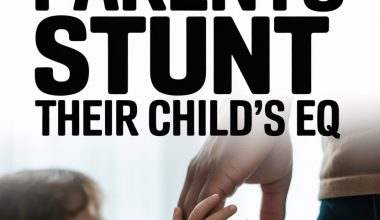You want the best for your child.
You read the books, keep the screens limited, sneak kale into pasta, and praise every finger-painting masterpiece like it’s the lost Van Gogh. You’re doing everything “right.”
But what if some of those earnest, gold-star efforts are quietly stacking up a bill your child will someday have to pay?
This isn’t about finger-wagging. It’s a peek behind the curtain, where “good parenting” sometimes morphs into something a little…well, suffocating.
Let’s have a proper look at the secret perils of chasing parenting perfection.
When Support Becomes Helicoptering
Every child needs a safety net, but nobody thrives with one hovering an inch above their head at all times.
That well-meaning impulse to smooth every path—reminding them of their spellings for the fifteenth time, swooping in to fix the wobbly science project—can quietly chip away at a child’s confidence.
Research found that children with hovering parents often develop higher levels of anxiety and struggle when faced with challenges alone.
The ironic twist? All those attempts to protect them from failure can leave them less prepared for the real world’s normal, everyday knock-backs.
Tonight, try resisting the urge to step in during a wobble. You might be surprised how much they can figure out—if you let them.
The Perfection Trap
“Just do your best!” you say, with a smile so wide it could break the sound barrier. Kids hear, “My best should be perfect.”
The relentless pursuit of achievement—whether it’s piano exams, maths clubs, or colour-coded reading charts—sets a pace that would make a hamster reconsider its life choices.
The American Psychological Association connects parental pressure for high achievement to increased anxiety, depression, and even burnout in children.
When ‘good parenting’ becomes ‘parenting for the report card,’ kids may grow up feeling worthy only when they excel.
Tonight, celebrate effort over outcome. Point out something they tried, even if the results looked like a Jackson Pollock painting gone wrong. There’s real courage in the mess.
Praise That Packs a Punch
Praising kids is practically a national sport. “You’re so clever!” “You’re the best footballer ever!” But overpraising—or focusing only on inherent traits—can leave children feeling like imposters when things don’t come easily.
Carol Dweck’s research on growth mindset shows that kids praised for effort, not talent, stick with tough tasks longer and are more resilient when they stumble.
But when every drawing earns a standing ovation, children start chasing approval instead of growth.
Try swapping “You’re brilliant!” for “I noticed how hard you worked on this.” See what blooms.
Always Being There…Until You’re Not
It’s natural to want to be present for every milestone—sports days, school plays, lost teeth, even the tragic demise of a goldfish named Sparkles.
Trouble is, being omnipresent can unintentionally teach kids that they’re never alone.
When parents solve every social squabble or rescue them from boredom, children miss out on building their own problem-solving muscles.
As a result, they may struggle with independence as teens and adults, according to child psychologist Dr. Michael Thompson.
Try giving your child the gift of a little boredom or a safe space to manage their own spats. They might surprise you with creativity—or just learn to sulk with style.
The Myth of Perfect Parenting
Comparison is the thief of joy, and nowhere is this more obvious than in parenting. Social media is a relentless parade of curated bento boxes and spotless playrooms, all filtered through just the right lighting.
It’s easy to feel like everyone else has the secret manual.
Research from the American Academy of Pediatrics found that mums and dads exposed to ‘perfect parenting’ images felt more inadequate, anxious, and less satisfied.
That “good parenting” pressure seeps into family life, setting expectations nobody can (or should) meet.
Tonight, unfollow a few “super-parents” and remember that your child’s sticky-fingered hug is worth a thousand pastel-filtered Instagram squares.
Protecting Kids from Failure
There’s a strong urge to shield children from disappointment.
Missed party invitations? We call the other parents. A forgotten lunch? We rush it to school. Each rescue feels like love.
But Dr. Madeline Levine argues that this type of ‘good parenting’ can rob children of crucial coping skills.
Kids who never experience small failures don’t develop resilience—they’re blindsided by setbacks as adults.
Next time your child forgets their shin pads at home, resist the rescue mission. Let them face the consequence. Growth happens in the discomfort.
Overscheduling and the Cult of Busy
Is your family calendar starting to look like air traffic control at Heathrow? Clubs, classes, tutoring…it’s easy to believe that more is always better.
But when every minute is planned, kids miss out on the magic of unstructured time—where imaginations run wild and boredom breeds creativity.
Too much scheduling can also cause stress and burnout, as highlighted by a UAB study.
Tonight, leave a gap in the schedule. See what your child does with an old cardboard box and a marker pen. Genius is often born out of “Mum, I’m bored!”
Emotional Micromanagement
“Don’t be sad!” “It’s not scary!” “Just be happy!” Parents want to comfort, to fix, to sweep away tears as quickly as possible.
The good intentions are obvious, but so is the hidden message: certain feelings aren’t allowed.
Dismissing or fixing emotions teaches kids to bottle up their real feelings.
Over time, this can lead to struggles with emotional regulation, as noted by child psychologist Dr. Lisa Damour.
Try listening and naming emotions without rushing to solve them. “You seem sad—want to talk about it, or just sit together?”
Your child learns that every feeling has a place at the table (even if it’s next to that cold, untouched broccoli).
Parenting for Appearances
Ever felt a flush of embarrassment when your child throws a tantrum at a birthday party? Or bristles when your “gentle parenting” is tested by a toddler with the negotiation skills of a top-tier lawyer?
Sometimes “good parenting” can become about how things look, not how they feel.
Living for the approval of others can make parenting brittle and transactional—about what you perform, not what you nurture. Kids are quick to sense when love or approval is conditional.
Tonight, remind yourself: you’re raising a person, not a performance. The audience doesn’t matter.
Sacrificing Yourself on the Altar of Parenting
There’s a silent competition over who can give up the most—hot meals, date nights, even sleep—for their kids. Martyrdom wears a halo in some parenting circles.
But children benefit from seeing their parents as real people with their own needs and interests.
When you only ever put yourself last, you risk exhaustion, resentment, and an unhealthy example of self-sacrifice.
A study published on American Psychological Association found that parental burnout is linked to behavioural and emotional issues in children. Turns out, taking care of yourself isn’t selfish—it’s essential.
Tonight, do one small thing just for you. Your children will learn that loving others includes loving yourself.
What ‘Good Parenting’ Really Means
A loving home is built on connection, not perfection. The odd slip-up, the burnt toast, the forgotten book bag—they’re all part of the messy, beautiful story your family is writing together.
‘Good parenting’ isn’t about shielding your child from every discomfort or curating a spotless childhood.
It’s about showing up as a human being, with all your quirks and failings, and giving your child the space to become one too.
Here’s to being “good enough”—and to the lessons our kids learn when we’re honest, imperfect, and, yes, sometimes even a little bit tired.
Pass the cold coffee, would you?




